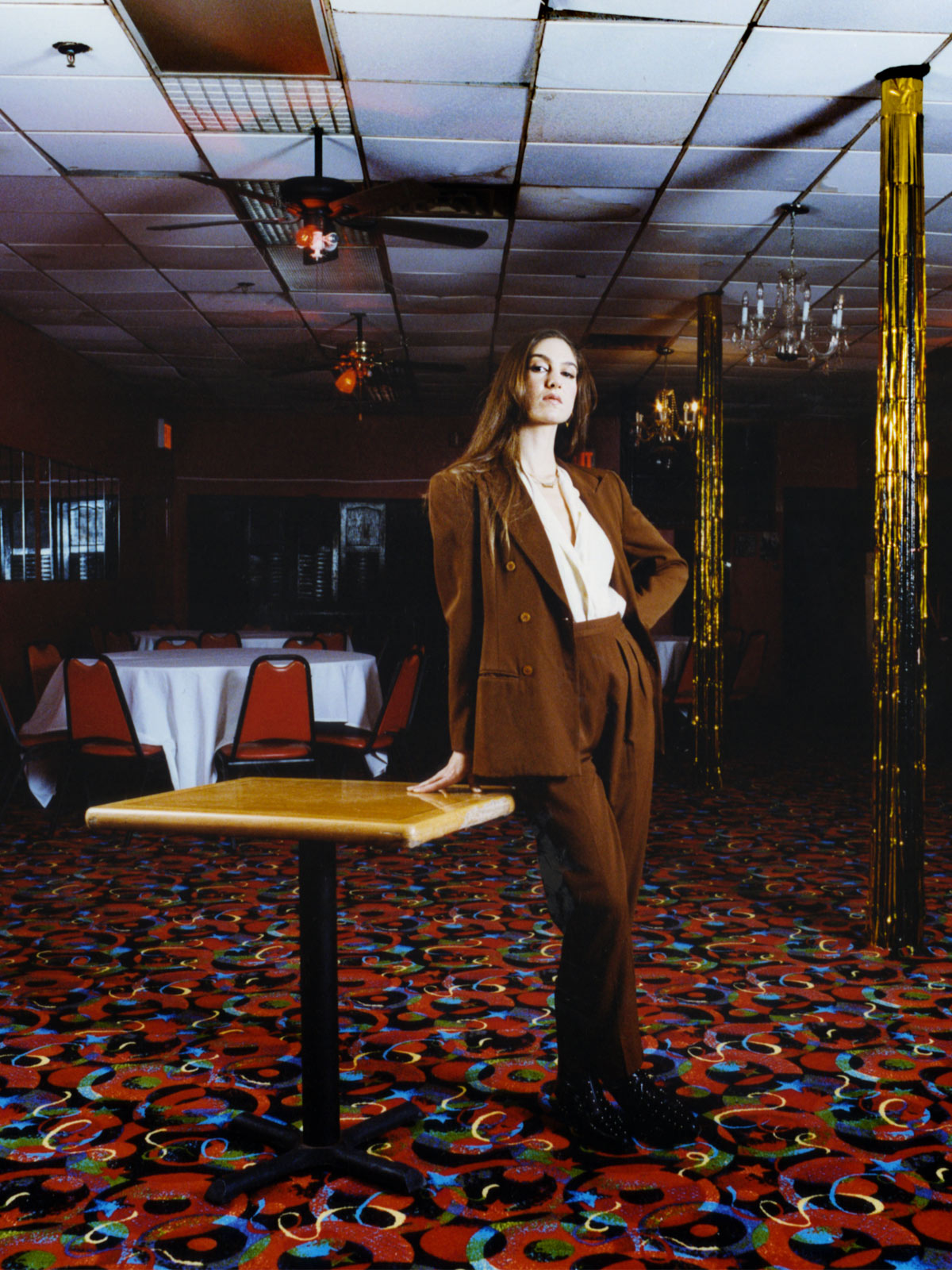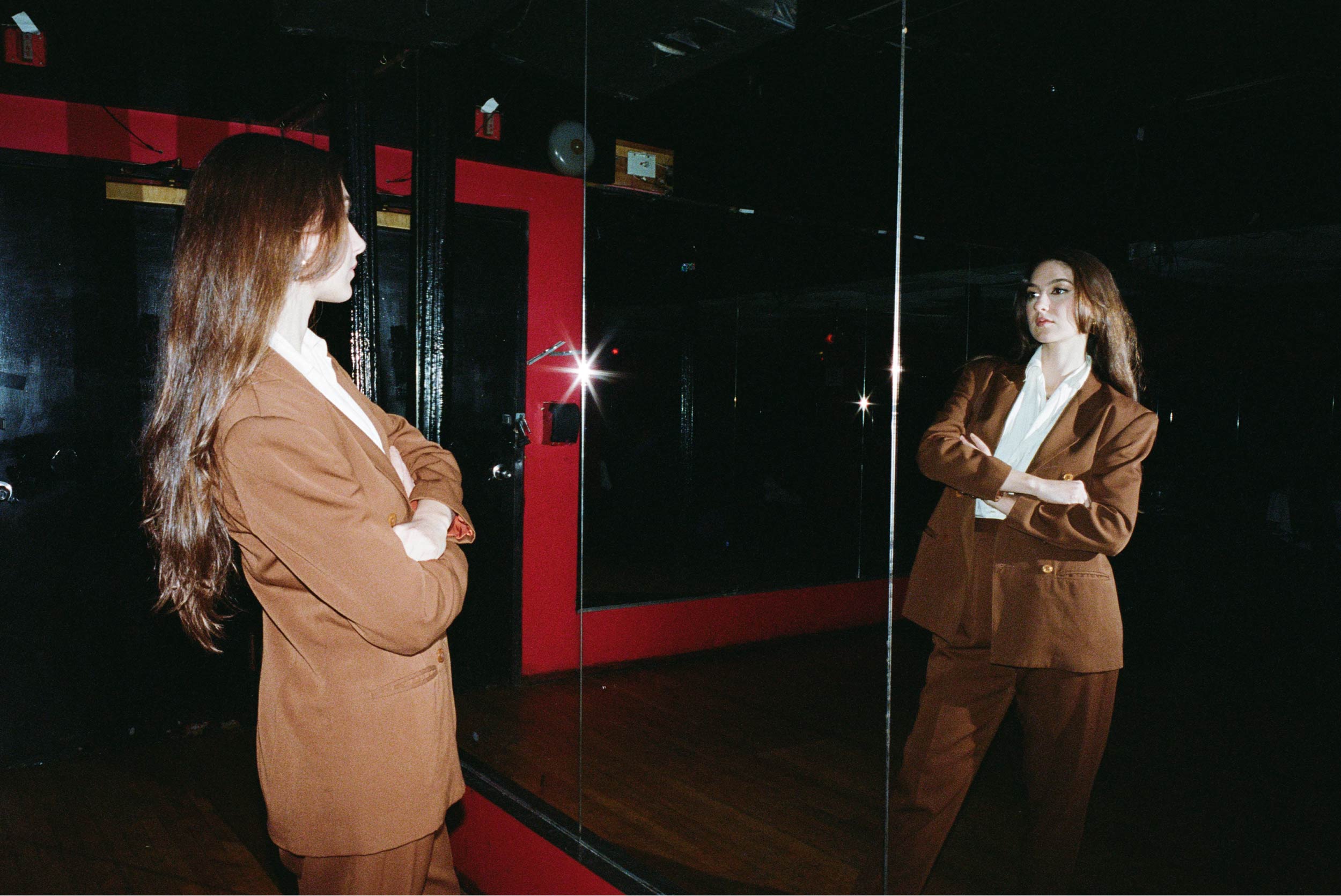On ‘And In The Darkness, Hearts Aglow,’ Natalie Mering explores the function of storytelling in the face of societal collapse
“What people don’t realize is that throughout history, most music has been made for sacred purposes—secular music, like love songs, was actually more fringe until the last couple of centuries,” says musician Natalie Mering, better known as Weyes Blood. That her music retains some of this essence comes as no surprise: Raised a Born Again Pentecostal Christian, she describes religion as a formative influence in her early life—not so much due to the strength of her belief, but rather because it provided a structure through which to understand the world. Once she denounced Christianity in her early-teens, she sought to fill the spiritual void with her own “patchwork cosmology”: one that privileges the cultural power of storytelling over organized religion. “It’s an evolutionary form of survival—to help process the feedback loop of our consciousness,” she says, sitting across the table from me at a Bed-Stuy coffee shop. “At the end of the day, all our myths and religions and stories exist to help us digest the paradox of our existence. To transcend, and make something out of the pain.”
It’s the same thing Mering hopes to achieve with her latest album, And In The Darkness, Hearts Aglow. But rather than provide a tidy framework through which to construct meaning, the record takes inventory of the fractured reality that makes discovering it for yourself so hard—from the way consumer capitalism has sold our sense of self back to us in the form of personal branding, to how technological platforms have furthered the divide between people by incentivizing self-promotion over connection and community. In today’s increasingly atomized culture, Mering believes that consumer capitalism has stepped in to fill the void organized religion left behind—leading to the invention of new gods and false idols, from American workism to the cult of self. “I think people are actually leaning deeper into [fulfilling] some semblance of the big dream they had for their own future, and you can’t really blame them for that,” she says, referencing the way that individual, attainable goals have taken precedence over activism and grassroots organizing, even in the midst of societal collapse. “It’s hard to tell everybody, ‘Give up on your dream and just try to fix the world right now,’ because the problems are so abstract.”
If you’re reflecting on the irony of this call-to-action coming from a pop star, Mering has beat you to the punch. “What’s the point of making a story or a song?” she muses. “I felt I had to go inward, to shed light on the kind of disillusionment we’re all feeling. I don’t think everybody always wants to hear something they already know, but at the same time, people do want their feelings and their emotions to be put in words. I think that’s the process of making art. It’s painful. It’s not glamorous or beautiful until it’s crystallized into an essence that becomes beautiful. It transforms the stuff of life into fantasy. And in human psychology, fantasy is just as important as reality.”
This pursuit of psychological transformation—of finding beauty in suffering—is embodied in melancholic tracks like “It’s Not Just Me, It’s Everybody,” a self-described “Buddhist anthem” in which Mering ruminates on the interconnectivity of all being—even in the face of a fraying social fabric. “Mercy is the only / cure for being so lonely,” she sings, prescribing empathy as the solution to our collective isolation. With velvety vocals and disquieting instrumental interludes, Mering’s latest release captures the contemporary disillusionment born of living through “unprecedented times.”
The album at first seems to lull one into a false sense of security with nostalgic-leaning chamber pop sound and crystalline vocals. But Mering’s lush sonic landscape soon gives way to otherworldly experimental stylings in tracks like “God Turn Me Into a Flower,” which derives inspiration from the story of Narcissus; elsewhere, she mines the dissonance between sound and content, pairing carefree pop structures with ominous warnings in songs like “The Worst is Done.” Shot through with themes of self-transformation and societal collapse, the record aptly captures millennial malaise and the cognitive dissonance of modern life. Whether it’s a swan song or call to action, however, is up to you.
Having grown accustomed to her soaring, diaphanous vocals, I’m surprised to find Mering is incredibly soft-spoken in person. “When I was younger, my music used to have more layers of noise,” she says, speaking about her decision to embrace sincerity, both sonic and lyrical. “That obfuscation was a safety net for me. And the clearer I get with myself, I realize I don’t want to be intentionally obtuse—it’s actually more powerful to be clear. Now I make very beautiful, listenable music—and to me, that is just as radical.”
“All our myths and religions and stories exist to help us digest the paradox of our existence. To transcend, and make something out of the pain.”
For Mering, the desire to obscure beauty, and the urge to adopt a veneer of removed cynicism, are cut from the same cloth. “I think it’s because anything like sincerity, vulnerability, or beauty can be weaponized with advertising in such a way that does feel like a betrayal,” she says. It’s unfortunate, but she doesn’t blame people for embracing cynicism as a form of catharsis. “Irony has become its own form of communication now, so we’re actually having very heavy conversations. We’re having our political discourse through the medium of these little snippets of entertainment,” she says. “That doesn’t mean that we’re, like, a bunch of nihilist brats—that’s the collateral of our culture.”
Mering’s thoughts on the subject have been informed by countless sources—for instance, Christopher Lasch’s The Culture of Narcissism, Neil Postman’s Amusing Ourselves to Death, and Guy Debord’s The Society of the Spectacle, which she said she tried to reread recently, but found too depressing to finish. “Everybody thought that, in the future, we’d be burning books and censoring everything, and that’s why it would be so hard to express yourself. In truth, we kind of went in a Brave New World direction, where there would be no need to burn books, because nobody reads. We would be so inundated with pleasure and entertainment they wouldn’t actually have to surveil us. We would willingly be surveilled.”
Intrinsic to this cultural moment is social media, and the need to perform your identity online. This modern form of self-mythology differs from that of previous generations, in that, rather than occurring in the public sphere, it transpires at home, often within the four walls of one’s bedroom. “Back in the day, to create myths about yourself, you had to perform them—if you were a character in the downtown music scene, you had to be that way in real life to embody and promote that weirdness,” she says. Now, you just have to be that way online. “There’s this false self that you can construct and then put down.”
Mering’s solution to living within a persona-based age is to maintain an aura of mystery, even in the midst of her increasing success. Active in the underground noise music scene, she was the bassist for Jackie-O Motherfucker and the singer for the band Satanized before she began self-releasing albums under variations of the name Weyes Blood in 2011. (Her moniker, which has undergone several evolutions, is a reference to the Flannery O’Connor novel Wise Blood, and is pronounced the same way.) After signing with the independent label Mexican Summer, she put out two albums—The Innocents (2014) and Front Row Seat to Earth (2016)—before releasing her latest studio album, Titanic Rising (2019) on Sub Pop to critical acclaim. She describes the record as an “observation of things to come,” whereas And In The Darkness, Hearts Aglow was written after the pandemic, while we were “living in the thick of it.” “A lot of things in society were already kind of frayed and cracked, and we could already feel that something about the way we were living was completely unsustainable,” she says. “The pandemic was the gasoline on that fire.”
The result is a subterranean and vulnerable album, born of strange times and a hope for change. Mering’s own life, too, has undergone countless transitions over the past few years: She’s bounced back and forth from state to state, living first in New York and then in Los Angeles. She’s performed sold-out tours in the US and Europe, opening for acts like Kacey Musgraves and Lana Del Rey. Even so, she identifies less as a musician and more of an “ideas man” (her words, not mine). “I don’t even know who I am,” she says. “I don’t have the strongest ego. I’m a chameleon. I’m not really a musician. I just have ideas.”
Mering’s ideas throw the cognitive dissonance of existing in today’s society into sharp disbelief. “It’s a cultural gridlock,” she says, running through the myriad manifestations of our societal disconnect. Despite our cultural focus on individualism and freedom of identity, there’s more conformism now than ever before, Mering asserts. Striving for community and acceptance, people dress more similarly; they get more plastic surgery; they fall back on outdated norms, searching for structure and limitation in an ocean of constant convenience, and ever-present dissatisfaction. We seek peace through striving for external achievements, yet constantly hunger for a source of meaning outside of the self.
At all junctures of our conversation, Mering makes sure to clarify that she doesn’t blame the individuals for manifesting these cultural trends—rather, she condemns the forces that bring these powers to bear, stating that she is no more exempt from their influence than anyone else. Charting our cultural tumult by looking both inward and outward, she has found a sense of empathy and connection with the countless others navigating these same conditions.
“Chaos is natural,” she states. “But so is the tendency for things to fall into order. These songs may not be manifestos or solutions, but I know they shed light on the meaning of our contemporary disillusionment. And maybe that’s the beginning of the nuanced journey toward understanding the natural cycles of life and death, all over again.”















